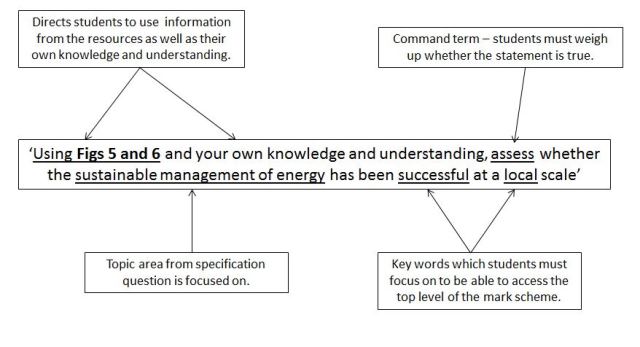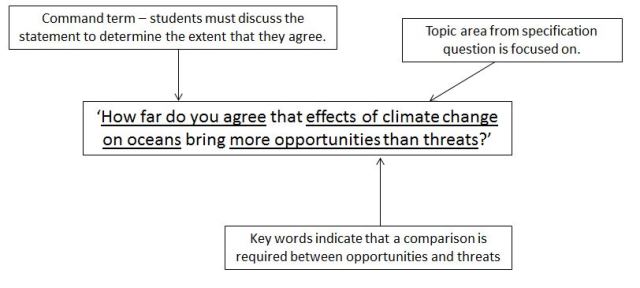How important are command words?
28 November 2016
We have received lots of questions from teachers asking about command words for our new Geography qualifications. But what are command words? And how important are they?
Command words are the words in the exam questions (usually one of the first words) which indicate what the examiner wants from the question and the style of the response needed. Knowing what command words mean is important for understanding the demands of the question – however the rest of the wording in a question is just as important to read. The rest of the wording will contextualise the question and might contain key words which affect how students should answer the question.
The following is an example of how to break a question down into its key parts, with this example being from the sample assessment material of one of our new GCSE (9–1) qualifications:

Below is another example of how to break a question down into its key parts, this time the question is from our new A Level sample assessment material:

The number of marks available for a question is also important when deciding on the best way to answer the question. For example, a two mark question for ‘explain’ would be answered differently to a six mark question with the same command word. What is required from a command word may also vary slightly depending on if interaction with a resource is required.
So whilst command words are important, it is just as important (or even more important) to read the whole question carefully and tailor any response to the actual wording of the question set.
Below are some definitions for a number of the most common command words that we used in our Sample Assessment Materials. These suggested definitions could be used to aid discussion but the important thing is that students understand what is required in an answer if they see the particular command word. Therefore teachers should translate the definitions into wording that will resonate with their students so they can understand what is required.
And remember to tell them to read every word in every question!
Command Words
| Potential definition
|
Assess
| Weigh up whether a statement is true.
|
Calculate
| Mathematically work out the value of something.
|
Compare
| Describe the similarities and differences of something.
|
Describe
| Set out the characteristics.
|
Discuss
| Bring forward the important points of or set out both sides of an argument/issue/element of content, for and against.
|
Evaluate
| Give your verdict after providing evidence which both agrees with and contradicts an argument.
|
Examine
| Look in close detail and establish the key facts and important issues.
|
Explain
| Set out the causes of something and/or the factors which influence it.
|
Suggest
| Offer an opinion for a particular course of action on an event or issue.
|
To what extent do you agree
| How much you agree with a statement based on the evidence in argument. |